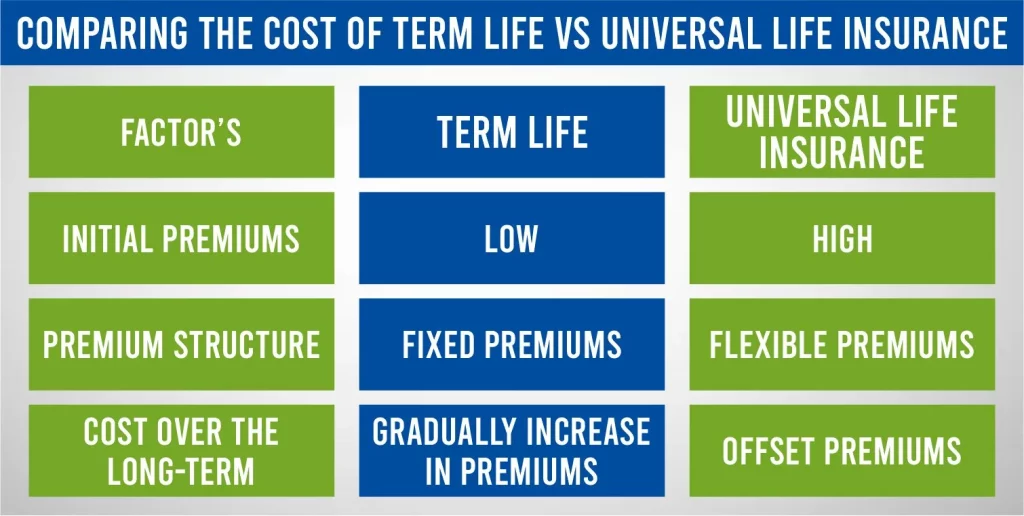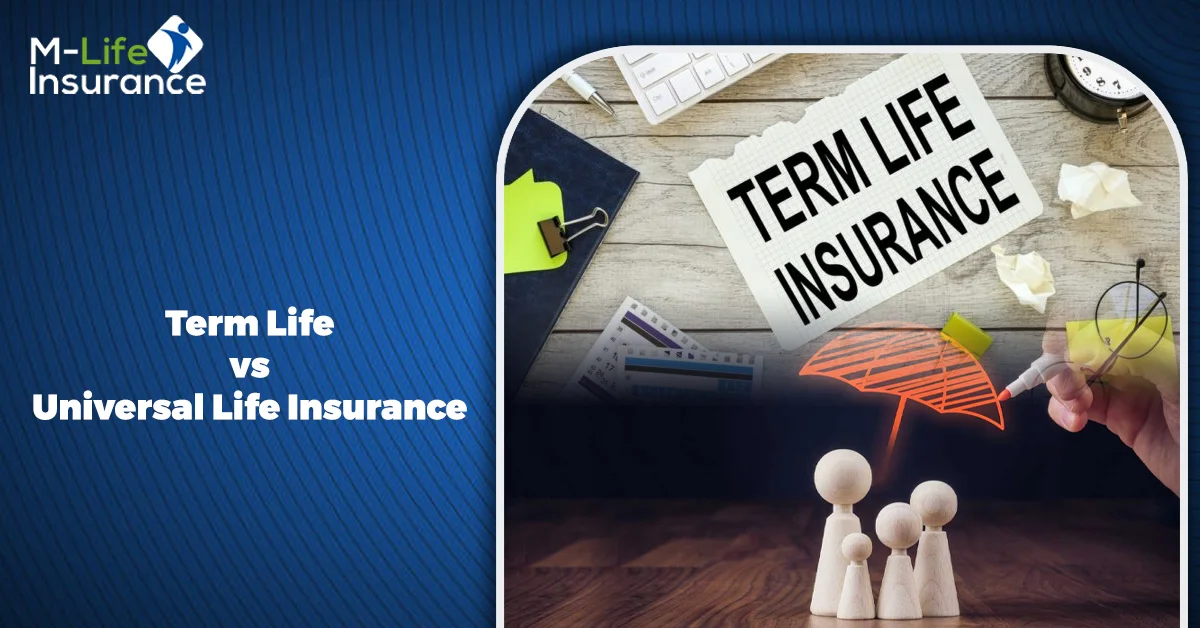Nowadays every one of us is worried about securing the future of our loved ones. One of the most effective ways to do so is by getting a life insurance plan. Life insurance offers a safety net that secures your family financially in case of your sudden death.
However, with a lot of options available, exploring the wide world of life insurance can be a difficult task for you. Among the most common choices are term life and universal life insurance. Although both of them have the same purpose (providing financial security), they also differ in other aspects like coverage, premiums, and others.
In this blog post, we will explore the complexities of term life vs universal life insurance, helping you make a better decision which suits your best with your needs.
What is Term Life Insurance?
Term life insurance is a type of life insurance that offers coverage only for a particular period usually from 10 to 30 years. During this time, the insured pays a regular premium (payment) to keep his policy active. However, if the policyholder dies within the term, the designated beneficiaries get a death benefit payment.
Unlike permanent life insurance policies, term life insurance does not accumulate cash value over time, keeping the focus only on providing a death benefit during the term of coverage. Its simplicity and affordability make it an attractive option for individuals seeking basic yet reliable protection for a predetermined period.
How does Term Life Insurance Work?
Term life insurance works on a straightforward process: you pay regular premiums to the insurance company in exchange for coverage for a specified term. If you pass away during the term of the policy, your beneficiaries receive a death benefit payout, providing them with financial protection and support. This lump-sum payment can help cover expenses such as mortgage payments, outstanding debts, funeral costs, and ongoing living expenses, ensuring that your loved ones are taken care of in your absence.
One of the key features of term life insurance is its affordability relative to other types of life insurance. Since term policies provide coverage for a specific period and do not accumulate cash value over time, premiums tend to be lower compared to permanent life insurance policies. Moreover, many term life insurance policies offer the option to renew or convert the policy to a permanent life insurance policy at the end of the term, providing flexibility for policyholders who may wish to extend their coverage or explore other options as their needs change over time.
What is Universal Life Insurance?
Universal life insurance is a type of permanent life insurance that provides coverage for your entire lifetime, as long as premiums are paid. Unlike term life insurance, which offers coverage for a specific term, universal life insurance offers lifelong protection. One of the distinguishing features of universal life insurance is its flexibility, allowing policyholders to adjust their premium payments and death benefits to suit their changing needs and circumstances.
In addition to the death benefit component, universal life insurance policies also include a cash value component. A portion of your premiums is allocated to a cash value account, which earns interest over time. This cash value grows tax-deferred and can be accessed by the policyholder during their lifetime through withdrawals or policy loans.
How does Universal Life Insurance Work?
Universal life insurance operates by combining a death benefit with a cash value component. Policyholders pay regular premiums, a portion of which goes towards the cost of insurance, while the remainder is deposited into a cash value account. This cash value grows over time, accumulating interest on a tax-deferred basis. Policyholders have the flexibility to adjust their premium payments and death benefits according to their changing needs and financial circumstances. They can also access the cash value through withdrawals or policy loans during their lifetime, providing a source of supplemental income or emergency funds.
Unlike term life insurance, which offers coverage for a specific term, universal life insurance provides coverage for the policyholder’s entire lifetime, as long as premiums are paid. Upon the policyholder’s death, the beneficiaries receive a death benefit payout, which is typically tax-free. Universal life insurance offers both flexibility and lifelong protection, making it a popular choice for individuals seeking to protect their loved ones while also building cash value over time.
Feature Comparison of Term Life vs Universal Life Insurance
When comparing term life vs universal life insurance, several key features distinguish the two types of policies:
1- Coverage Duration
- Term Life Insurance: Provides coverage for a specific term, typically ranging from 10 to 30 years.
- Universal Life Insurance: Offers coverage for the policyholder’s entire lifetime, as long as premiums are paid.
2- Premiums
- Term Life Insurance: Typically features lower premiums compared to universal life insurance, making it more affordable for individuals seeking basic protection for a specific period.
- Universal Life Insurance: Involves higher premiums due to the lifelong coverage and cash value component, offering flexibility in premium payments.
3- Cash Value Accumulation
- Term Life Insurance: Does not accumulate cash value over time, focusing only on providing a death benefit during the term of the policy.
- Universal Life Insurance: Includes a cash value component where a portion of premiums is deposited into a cash value account, which grows over time on a tax-deferred basis, providing potential for savings and supplemental income.
4- Flexibility
- Term Life Insurance: Offers simplicity with fixed premiums and coverage for a predetermined term. Some policies may include options for conversion to permanent life insurance.
- Universal Life Insurance: Provides flexibility in premium payments and death benefits, allowing policyholders to adjust their coverage according to changing needs and circumstances. Additionally, policyholders can access the cash value through withdrawals or policy loans during their lifetime.
5- Risk of Policy Lapse
- Term Life Insurance: Generally carries a lower risk of policy lapse since coverage is provided for a specific term, and premiums are typically fixed.
- Universal Life Insurance: Carries a higher risk of policy lapse if the cash value is insufficient to cover policy expenses, requiring careful monitoring and management to ensure the policy remains adequately funded.
In summary, term life insurance offers affordable, straightforward coverage for a specific term, while universal life insurance provides lifelong protection with flexibility in premium payments and potential cash value accumulation. However, the choice between the two depends on individual financial goals, preferences, and circumstances.

Comparing the Cost of Term Life vs Universal Life Insurance
When comparing the cost of term life insurance to universal life insurance, several factors come into play:
- Initial Premiums
- Term Life Insurance: Typically features lower initial premiums compared to universal life insurance since it provides coverage for a specific term without a cash value component.
- Universal Life Insurance: Involves higher initial premiums due to the lifelong coverage and cash value accumulation feature.
- Premium Structure
- Term Life Insurance: Offers fixed premiums for the term, providing predictability and affordability during the coverage period.
- Universal Life Insurance: Often features flexible premium payments, allowing policyholders to adjust their premiums and death benefits according to their changing needs. While this flexibility can be advantageous, it may result in higher overall premiums over time.
- Cost Over the Long-Term
- Term Life Insurance: While initial premiums are lower, the cost of term life insurance may increase significantly if the policyholder chooses to renew the policy at the end of the term or purchase a new policy at an older age. Additionally, term life insurance policies do not accumulate cash value, so premiums are only for the death benefit.
- Universal Life Insurance: Although premiums are higher initially, universal life insurance policies provide coverage for the policyholder’s entire lifetime and offer potential cash value accumulation. While this cash value can help offset premiums in later years, it’s essential to consider the overall cost over the long term.
- Factors Affecting Cost
- Age: Premiums for both term life and universal life insurance increase with age, with older individuals typically paying higher premiums.
- Health: Health factors, such as pre-existing conditions or tobacco use, can impact the cost of premiums for both types of insurance.
- Coverage Amount: The amount of coverage desired also affects premiums, with higher coverage amounts resulting in higher premiums.
Where term life insurance may offer lower initial premiums, universal life insurance provides lifelong coverage and potential cash value accumulation, although at a higher cost. The choice between the two depends on individual financial goals, budgets, and preferences. It’s essential to carefully evaluate the cost and benefits of each type of insurance before making a decision.
How to Choose Between Term Life vs Universal Life Insurance
Choosing between term life and universal life insurance requires considering your financial goals, budget, and preferences:
- Assess Your Needs: Determine the coverage amount and duration you require. If you have short-term needs or a limited budget, term life insurance may be suitable. For lifelong coverage and potential cash value accumulation, consider universal life insurance.
- Evaluate Your Budget: Compare premiums for both types of insurance. Term life insurance generally offers lower initial premiums, while universal life insurance premiums may be higher but provide lifelong coverage and cash value growth.
- Consider Risk Tolerance: Understand your comfort level with risk. Term life insurance offers straightforward coverage, while universal life insurance involves more flexibility but also the risk of policy lapse if the cash value is insufficient.
- Future Needs: Think about potential changes in your financial situation or needs. Universal life insurance allows for adjustments in coverage and access to cash value, making it suitable for evolving financial goals.
- Seek Professional Advice: Consult with a licensed insurance agent or financial advisor to get personalized recommendations based on your situation. They can help clarify any questions and ensure you make an informed decision.
Conclusion
By understanding the differences between term life vs universal life insurance, you can make an informed decision that aligns with your goals and priorities. Whether you opt for the simplicity of term life insurance or the flexibility of universal life insurance, the most crucial step is taking proactive measures to safeguard your family’s future.

Meet the mind behind our life insurance insights! With a finance background and hands-on experience, Khadija simplifies complex insurance plans for you. Trust our expert to guide you through policies, terms, and financial decisions with clear, concise, and easy-to-read content.


